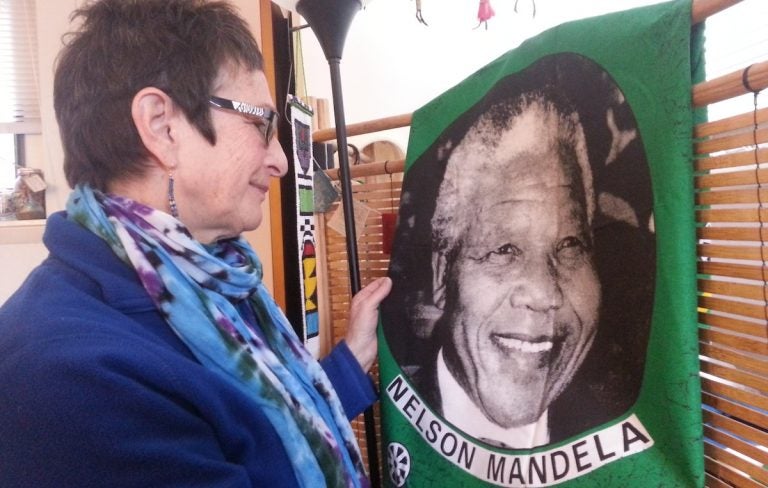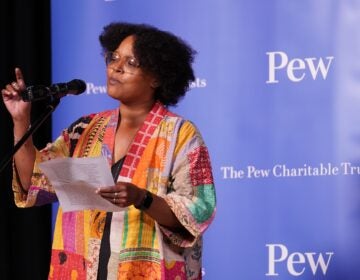West Mt. Airy civic leader recalls years working alongside Nelson Mandela

Marilyn Cohen looks fondly at a piece of Nelson Mandela memorabilia from her years in South Africa. (Aaron Moselle/WHYY)
Thousands of people — world leaders and global stars included — are descending on FNB Stadium in Johannesburg, South Africa for Nelson Mandela’s memorial service today.
Mt. Airy resident Marilyn Cohen won’t be there, but the legendary leader will likely be on her mind. He is every day.
“He absolutely changed me,” said Cohen on Monday inside her Bryan Street home, a Mandela-themed clock hanging nearby.
“I think I knew a little bit about compassion and caring for others. I think I did good things before I met him, but he always pushed you to do more and to think more broadly and to really, really walk in the other person’s shoes. He was brilliant in that way.”
First encounters
Cohen, a Philadelphia native, first traveled to South Africa in 1992 as the country worked towards ending apartheid, a decades-old system of racial discrimination that severely restricted the rights of the black majority.
She booked her flight after speaking with members of Sharon Katz & The Peace Train after an evening concert. The South Africa-based group formed to help promote interracial relations and community empowerment and often performed at Mandela events.
Cohen decided to use six weeks worth of saved-up vacation days to travel to South Africa and help the cause.
“By the end of those two weeks, I was doubting if I was going to go back. By the end of four weeks, I knew I wasn’t for sure…and by the end of six weeks I really knew I wasn’t going back,” said Cohen, who was serving as Philadelphia’s mental health administrator at the time.
Weeks turns into years
Over the next eight years, Cohen was at the center of post-apartheid reconstruction.
She was part of an ongoing effort to create a new blueprint for governmental rule and helped prepare millions of residents to vote in the country’s first-ever democratic election in 1994, during which Mandela, representing the African National Congress, became South Africa’s first-ever black president.
Cohen also had a hand in job training, teacher training and therapy sessions after the election to help make the end of apartheid a more tangible shift for the county’s population.
She first met Mandela at his 75th birthday celebration in 1993. It was a life-changing experience.
“I don’t think there are enough words to describe what it feels like to be in his aura. He’s more extraordinary than the media make him to be,” said Cohen.
Building a democracy
So was working the 1994 election, during which lines snaked out of polling places for hours on end.
Cohen, a member of the Independent Electoral Commission, was based in KwaZulu-Natal, at the time, the largest and perhaps most politically violent of the then four provinces of the country.
Members of the ANC and the Inkatha Freedom Party often clashed with one another as they campaigned in the region, home to some 12 million people.
Cohen had a gun pulled on her twice and said two of her voter education staffers were killed in prison as she and others negotiated directly with Mangosuthu Buthelezi, IFP’s leader and one of 16 candidates running against Mandela, for their release.
“It was a very difficult job to do, but nowhere near as difficult as the lives that the majority of South Africans had been for all of those decades,” said Cohen, who oversaw the region’s voter outreach, registration efforts and the creation of polling places.
On Election Day, Cohen was stationed at the command post for South Africa’s armed forces, which were brought in to help ensure the election was “free and fair.”
“Even now, I have goose bumps talking about it,” said Cohen. “I have to say it was the greatest day of my life.”
Keeping Mandela’s legacy alive
For Cohen, Mandela’s death was, not surprisingly, “a huge loss.” Since the 95-year-old died Thursday, she’s hardly spoken to anyone about the impact he had on her life.
But while there’s sadness, Cohen also feels, more than anything, fortunate to have lived and worked, as she puts in, in Mandela’s “aura.”
“Now,” she said. “We all have to make sure that we keep his legacy alive. He’s not there to do it for us.”
WHYY is your source for fact-based, in-depth journalism and information. As a nonprofit organization, we rely on financial support from readers like you. Please give today.





